人教版八年级英语上册时态知识总结及练习
八年级英语4种时态复习及练习 人教版上册
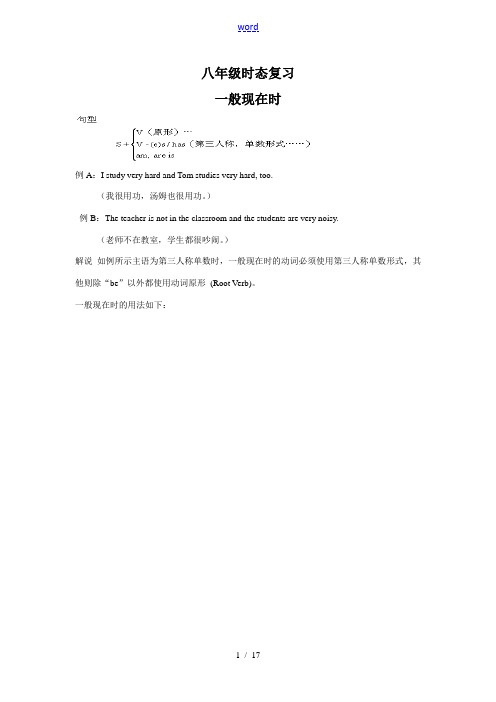
八年级时态复习一般现在时例A:I study very hard and Tom studies very hard, too.(我很用功,汤姆也很用功。
)例B:The teacher is not in the classroom and the students are very noisy.(老师不在教室,学生都很吵闹。
)解说如例所示主语为第三人称单数时,一般现在时的动词必须使用第三人称单数形式,其他则除“be”以外都使用动词原形(Root Verb)。
一般现在时的用法如下:解说文法上一般现在时所指的“现在(at the time of speaking)”其实其观念并非是绝对的。
这里所指的现在是在表明说话时存在着的事物,其时间领域含盖着过去,也将延伸及将来。
例如:It is very hot today.(今天天气很热。
---如说话时间是在中午,本句话是在表明说话时“天气很热”,实际上“天气热”的现象在中午之前就已开始存在,同时也将延伸到下午。
)例:Dogs bark at strangers.(狗看到陌生人就会吠。
──这句话是在谈狗的习性,说话时不一定有狗正在吠,而狗的这种习性可以追溯及远古,当然也将延伸到将来。
)因此,一般现在时所指的“现在”可以图示如下:一般现在时常可用时间副词如“today,this + time (this week, this year, …),now,right now,at present,etc.”来修饰。
△动词第三人称单数的规则变化1. 一般情况:加-s 例:reads,writes,says2. 以s,x,ch,sh和部分以o结尾的词加-es 例:teaches,washes,guesses3. 以辅音字母+y结尾的词变y为i再加-es 例:try—tries,carry—carries.☆☆☆[一般现在时的用法] 简述1) 经常性或习惯性的动作,常与表示频腮度的时间状语连用。
新人教版八年级上册英语时态精选练习题附答案
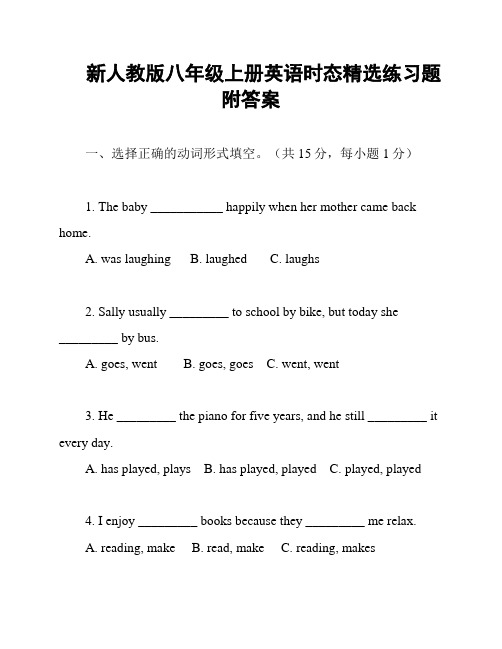
新人教版八年级上册英语时态精选练习题附答案一、选择正确的动词形式填空。
(共15分,每小题1分)1. The baby ___________ happily when her mother came back home.A. was laughingB. laughedC. laughs2. Sally usually _________ to school by bike, but today she_________ by bus.A. goes, wentB. goes, goesC. went, went3. He _________ the piano for five years, and he still _________ it every day.A. has played, playsB. has played, playedC. played, played4. I enjoy _________ books because they _________ me relax.A. reading, makeB. read, makeC. reading, makes5. By the time he _________ the work, it _________ for seven hours.A. finishes, will rainB. finishes, has rainedC. finishes, will have rained二、用所给动词的正确形式填空。
(共15分,每小题1分)1. My grandfather usually _________ (get) up at 6 a.m.2. We _________ (go) to the zoo last Sunday.3. The students _________ (play) basketball every Monday.4. Tina _________ (watch) TV for two hours yesterday evening.5. Lily _________ (not go) to bed until 11 p.m. last night.三、按要求改写句子,每空一词。
人教版八年级英语上册知识点总结

人教版八年级英语上册知识点总结一、基本语法1.时态:英语时态分为以下几种:现在时、过去时、将来时。
每种时态又分为简单时态、进行时态、完成时态和完成进行时态等。
例如:–现在时:简单现在时: 主语 + 动词原形;进行现在时:主语 + be(am/is/are) + v-ing;完成现在时:主语 + have / has + 过去分词;完成进行现在时:主语 + have / has + been + v-ing。
–过去时:简单过去时:主语 + 动词过去式;进行过去时:主语 + was / were + v-ing;完成过去时:主语 + had + 过去分词;完成进行过去时:主语 + had + been + v-ing。
–将来时:简单将来时:主语 + will / shall + 动词原形;进行将来时:主语 + will / shall + be + v-ing;完成将来时:主语 + will / shall + have + 过去分词;完成进行将来时:主语 + will / shall + have + been + v-ing。
2.倒装句:倒装是指把谓语动词放在主语前面形成的一种语法现象。
如:Only in this way can we solve the problem. (只有这样才能解决问题。
) 倒装句句型格式为:_____+主语(名词或代词)+_____。
在不同的情况下需要用到不同的“辅助动词/助动词”来进行倒装。
3.被动语态:被动语态就是在句子中表达动作的承受者(即主语)的语态。
结构为:被(或受)动责任的动词(to be) + 过去分词。
如:The book was written by him.(这本书是由他写的。
)4.虚拟语气:虚拟语气是指在表示假设,愿望,建议等语气时所使用的一种语态形式。
其结构为:主语+should/could/might/would+(have)+动词原形。
如: If I were you, I would buy this dress(如果我是你,我会买这件衣服。
初中英语时态知识点总结人教版
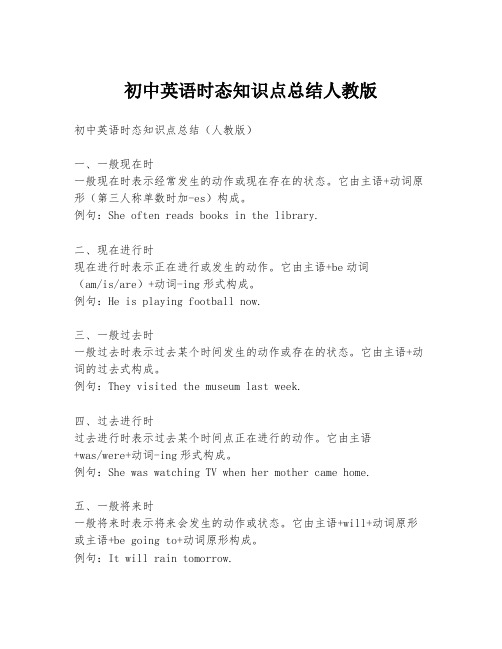
初中英语时态知识点总结人教版初中英语时态知识点总结(人教版)一、一般现在时一般现在时表示经常发生的动作或现在存在的状态。
它由主语+动词原形(第三人称单数时加-es)构成。
例句:She often reads books in the library.二、现在进行时现在进行时表示正在进行或发生的动作。
它由主语+be动词(am/is/are)+动词-ing形式构成。
例句:He is playing football now.三、一般过去时一般过去时表示过去某个时间发生的动作或存在的状态。
它由主语+动词的过去式构成。
例句:They visited the museum last week.四、过去进行时过去进行时表示过去某个时间点正在进行的动作。
它由主语+was/were+动词-ing形式构成。
例句:She was watching TV when her mother came home.五、一般将来时一般将来时表示将来会发生的动作或状态。
它由主语+will+动词原形或主语+be going to+动词原形构成。
例句:It will rain tomorrow.六、将来进行时将来进行时表示将来某个时间点正在进行的动作。
它由主语+will be+动词-ing形式构成。
例句:He will be working at this time tomorrow.七、现在完成时现在完成时表示过去发生的动作对现在造成的影响或结果,或者是从过去开始一直持续到现在的动作。
它由主语+have/has+动词的过去分词构成。
例句:I have finished my homework.八、现在完成进行时现在完成进行时表示从过去某一时间开始,一直持续到现在并可能继续下去的动作。
它由主语+have/has been+动词-ing形式构成。
例句:She has been studying English for five years.九、过去完成时过去完成时表示在过去某个时间点之前已经完成的动作。
人教版八年级英语知识点总结
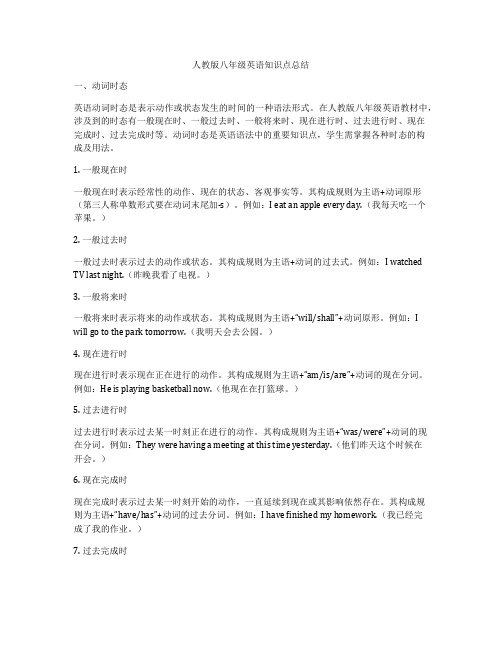
人教版八年级英语知识点总结一、动词时态英语动词时态是表示动作或状态发生的时间的一种语法形式。
在人教版八年级英语教材中,涉及到的时态有一般现在时、一般过去时、一般将来时、现在进行时、过去进行时、现在完成时、过去完成时等。
动词时态是英语语法中的重要知识点,学生需掌握各种时态的构成及用法。
1. 一般现在时一般现在时表示经常性的动作、现在的状态、客观事实等。
其构成规则为主语+动词原形(第三人称单数形式要在动词末尾加-s)。
例如:I eat an apple every day.(我每天吃一个苹果。
)2. 一般过去时一般过去时表示过去的动作或状态。
其构成规则为主语+动词的过去式。
例如:I watched TV last night.(昨晚我看了电视。
)3. 一般将来时一般将来时表示将来的动作或状态。
其构成规则为主语+“will/shall”+动词原形。
例如:I will go to the park tomorrow.(我明天会去公园。
)4. 现在进行时现在进行时表示现在正在进行的动作。
其构成规则为主语+“am/is/are”+动词的现在分词。
例如:He is playing basketball now.(他现在在打篮球。
)5. 过去进行时过去进行时表示过去某一时刻正在进行的动作。
其构成规则为主语+“was/were”+动词的现在分词。
例如:They were having a meeting at this time yesterday.(他们昨天这个时候在开会。
)6. 现在完成时现在完成时表示过去某一时刻开始的动作,一直延续到现在或其影响依然存在。
其构成规则为主语+“have/has”+动词的过去分词。
例如:I have finished my homework.(我已经完成了我的作业。
)7. 过去完成时过去完成时表示过去某一时刻之前已经发生的动作。
其构成规则为主语+“had”+动词的过去分词。
例如:She had gone to the park before I arrived.(我到达之前她已经去公园了。
人教版英语八年级上册时态专项练习(附答案)

人教版英语八年级上册时态专项练习(附答案)一、选择填空。
1. A: Is Jane at home?B: I'm not sure. She ________ (visit) her grandparents today.答案:is visitingB: Sorry, I can't. I have to study for my exam.3. A: How long ________ (you/live) in New York?B: I ________ (live) here for three years.答案:have you lived, have lived4. A: ________ (you/go) to the concert tomorrow?B: No, I ________ (not/buy) a ticket yet.答案:Are you going, haven't bought5. A: When ________ (he/arrive) at the airport?B: He ________ (arrive) at 10:00 am.答案:did he arrive, arrived二、根据句意再写出一个与之意思相近的句子。
1. They have finished their homework.答案:Their homework is done.2. We are going to visit the Great Wall next week.答案:Next week, we will visit the Great Wall.3. Tom often reads books in the library.答案:Reading books in the library is often done by Tom.4. She didn't go to bed until 11 o'clock last night.答案:She went to bed at 11 o'clock last night.5. My sister and I have studied English for two years.答案:My sister and I have been studying English for two years.三、改错。
初二英语上册知识点总结(人教版)

初二英语上册知识点总结(人教版)1. 语法知识点- 一般现在时:表示经常性或惯性的动作、状态或客观真理。
- 一般过去时:表示过去发生的动作或存在的状态。
- 现在进行时:表示现在正在进行的动作。
- 一般将来时:表示将来将要发生的动作或存在的状态。
- 定语从句:用来修饰名词或代词的从句。
- 状语从句:用来表示时间、地点、原因、条件或目的等的从句。
- 直接引语和间接引语的转换:将直接引语转化成间接引语需要考虑时态、人称、时间、地点等问题。
2. 词汇与短语- 常用动词短语:例如,look forward to, take part in, give up等。
- 时间短语:例如,in the morning, at night, on weekends等。
- 形容词与副词:例如,beautiful, quickly, slowly等。
- 连词与介词:例如,but, and, in, on等。
3. 句型结构- 主语 + 谓语:例如,Tom studies English.- 主语 + 不及物动词 + 状语:例如,He runs quickly.- 主语 + 系动词 + 表语:例如,She is beautiful.- 主语 + 及物动词 + 宾语:例如,I eat an apple.4. 阅读技巧- 理解词义:通过上下文判断单词的意思。
- 掌握关键信息:抓住文章中的重要信息。
- 推测逻辑关系:通过逻辑推理理解段落和篇章的结构。
- 注意细节问题:注意文章中的细节信息。
5. 听力技巧- 提前预测:在听对话或短文之前,先预测可能会涉及的内容。
- 注意语境:在听时将听到的语句与前后语境联系起来理解。
- 注意听力焦点:抓住关键词汇、数字和特别强调的内容。
以上是初二英语上册知识点的简单总结,希望对你有帮助!。
人教版八年级英语上册知识点总结

人教版八年级英语上册知识点总结人教版八年级英语上册知识点句子成分和类型1.主语:句子所陈述的对象。
2.谓语:主语发出的动作。
一般是有动作意义的动词。
3.宾语:分为动词宾语和介词宾语,属于动作的承受者。
4.系动词:表示状态或状态变化的动词,没有实际的动作意义。
如 be,感官系动词(look, sound, smell, taste 和 feel)、保持类系动词(keep,stay 和 remain)、状态变化类系动词(become、get、turn 和 go)等。
5.表语:紧跟系动词后面的成分。
6.定语:修饰名词或代词的成分。
7.状语:修饰形容词、副词、动词或句子的成分。
8.补语:分为宾语补足语和主语补足语。
是对宾语和主语的补充说明,与其有主动或被动的逻辑关系。
例如:You should keep the room clean and tidy.你应该让屋子保持干净整洁。
(You是主语, should keep是谓语,the room是宾语,clean and tidy是宾语补足语。
)This kind of food tastes delicious.这种食物吃起来很可口。
(This kind of food是主语, tastes是系动词, delicious是表语。
)注意:主语、谓语、宾语、系动词、表语、补语是一个句子的主干成分;定语和状语是一个句子的修饰性成分,不是主干成分。
9.简单句的基本形式是由一个主语加一个谓语构成。
10.复合句由一个主句和一个或一个以上的从句构成。
11.两个或两个以上的简单句用并列连词连在一起构成的句子,叫做并列句,其基本结构是“简单句+并列连词+简单句”。
一般疑问句一、不用疑问词,但需要用yes或no回答的疑问句,叫一般疑问句。
句末用问号“?”。
一般疑问句的基本用法及结构一般疑问句用于对某一情况提出疑问,通常可用yes和no来回答,读时用升调。
其基本结构是“be / have / 助动词+主语+谓语(表语)”:Is he interested in going? 他有兴趣去吗?Have you ever been to Japan? 你到过日本吗?Does she often have colds? 她常常感冒吗?Did you ask her which to buy? 你问没问她该买哪一个?二、陈述句变一般疑问句的方法1.动词be的疑问式:动词be根据不同的时态和人称可以有am, is, are,was, were等不同形式,可用作连系动词(表示“是”、“在”等)和助动词(用于构成进行时态和被动语态等),但不管何种情况,构成疑问式时,一律将动词be的适当形式置于句首:句型:Be动词+主语~?Is your father angry?你父亲生气了吗?Yes,he is.是的,他生气了。
新人教版八年级上册英语时态精选练习100题附答案[1]
![新人教版八年级上册英语时态精选练习100题附答案[1]](https://img.taocdn.com/s3/m/840ac0b3f01dc281e43af0b3.png)
新人教版八年级上册英语时态精选练习100题附答案(word版可编辑修改)新人教版八年级上册英语时态精选练习100题附答案(word版可编辑修改) 编辑整理:尊敬的读者朋友们:这里是精品文档编辑中心,本文档内容是由我和我的同事精心编辑整理后发布的,发布之前我们对文中内容进行仔细校对,但是难免会有疏漏的地方,但是任然希望(新人教版八年级上册英语时态精选练习100题附答案(word版可编辑修改))的内容能够给您的工作和学习带来便利。
同时也真诚的希望收到您的建议和反馈,这将是我们进步的源泉,前进的动力。
本文可编辑可修改,如果觉得对您有帮助请收藏以便随时查阅,最后祝您生活愉快业绩进步,以下为新人教版八年级上册英语时态精选练习100题附答案(word版可编辑修改)的全部内容。
新人教版八年级上册英语时态精选练习100题附答案(word版可编辑修改)新人教版八年级上册英语时态精选练习题附答案1. Li Ping often _____ (read) English in the morning。
2。
_____ he _____ (clean) the windows once a week?3. The workers _____ (have) sports on the playground now。
4. How long ___ you __ (stay) there the day before yesterday?5. Who _____ (listen) to the music?6. When I ____ (be) a middle school student, I often ___(sing).7。
His parents ____(go) to the Great Wall tomorrow morning.8. ____ they _____ (study) Japanese next term?9。
人教版八年级上英语时态总结
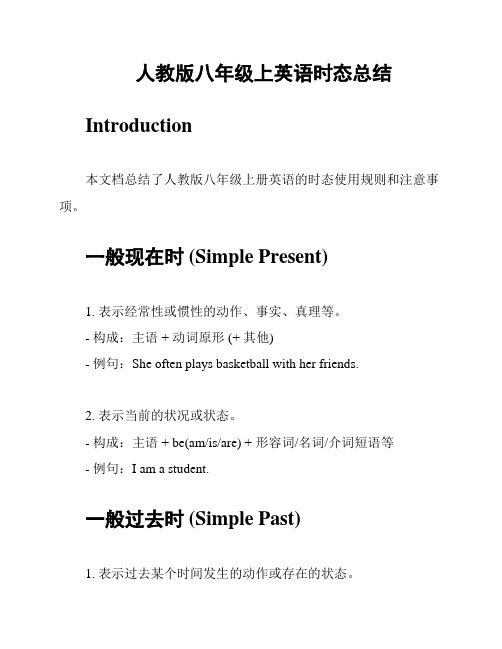
人教版八年级上英语时态总结Introduction本文档总结了人教版八年级上册英语的时态使用规则和注意事项。
一般现在时 (Simple Present)1. 表示经常性或惯性的动作、事实、真理等。
- 构成:主语 + 动词原形 (+ 其他)- 例句:She often plays basketball with her friends.2. 表示当前的状况或状态。
- 构成:主语 + be(am/is/are) + 形容词/名词/介词短语等- 例句:I am a student.一般过去时 (Simple Past)1. 表示过去某个时间发生的动作或存在的状态。
- 构成:主语 + 动词过去式 (+ 其他)- 例句:He studied English last night.一般将来时 (Simple Future)1. 表示将来某个时间或将来经常性发生的动作。
- 构成:主语 + will + 动词原形 (+ 其他)- 例句:They will visit their grandparents next week. 现在进行时 (Present Continuous)1. 表示当前正在进行的动作。
- 构成:主语 + be(am/is/are) + 现在分词(+ 其他) - 例句:She is watching TV right now.过去进行时 (Past Continuous)1. 表示过去某个时间正在进行的动作。
- 构成:主语 + was/were + 现在分词(+ 其他)- 例句:They were playing soccer at that time.高级时态1. 现在完成时 (Present Perfect)- 表示过去的某个时间到现在的动作或状态。
- 构成:主语 + have/has + 过去分词(+ 其他)- 例句:I have finished my homework.2. 过去完成时 (Past Perfect)- 表示过去的某个时间之前的动作或状态。
人教版英语八年级英语句型及语法(英语动词的时态)附解析

人教版英语八年级英语句型及语法(英语动词的时态)附解析一、初中英语动词的时态1.--Where is Grace?--She with her brother playing basketball at school.A.is practice B.is practicing C.are practicing D.are practice【答案】B【解析】句意:——格雷斯在哪里?——她正在和她哥哥在学校练习打篮球。
be后跟现在分词,构成现在进行时态,此句的主语为she,with her brother做状语,be用is,故答案为B。
点睛:主语为单数名词或代词,尽管后面跟有with,together with,along with,as well as,besides,except,but,like等介词或介词短语时,谓语动词用单数形式。
例如:Mike with his father has been to England. 迈克同他的父亲去过英格兰。
Mike, like his brother, enjoys playing football. 迈克像他的哥哥一样喜欢踢足球。
2.--- Where’s my father? Could tell me?--- He to Beijing. He’ll attend an important meeting.A.goes B.is going C.has gone D.has been【答案】C【解析】【详解】句意:——我的父亲在哪里?可以告诉我吗?——他已经去北京了。
他将参加一个重要会议。
考查动词时态辨析。
根据句意语境,可知父亲不在说话的地点已经去了北京,需用现在完成时,可排除AC两项。
have been to意为“曾经去过某地”,现在已不在那里了;have gone to意为“到某地去了”,说话时作句子主语的人不在现场,故选C。
3.By the time I ________ on the TV, Beckham ________ two goals.A.turned; have scored B.turned; had scoredC.had turned; have scored D.had turned; had scored【答案】B【解析】句意:当我打开电视的时候,贝克汉姆已经进了两个球。
八年级上册英语人教版知识点总结归纳
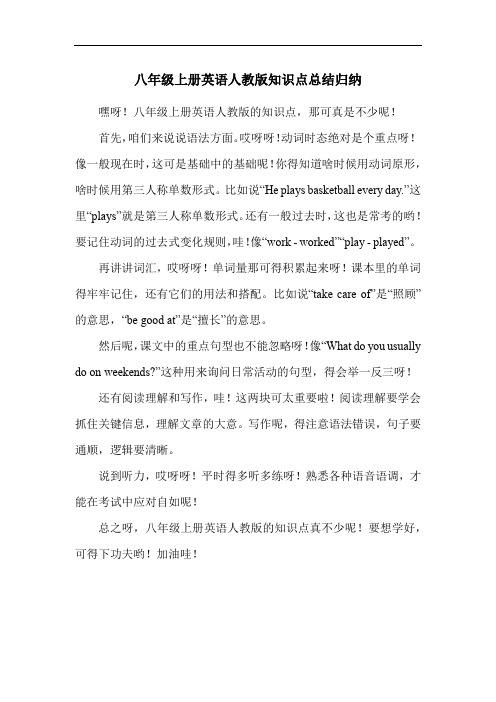
八年级上册英语人教版知识点总结归纳
嘿呀!八年级上册英语人教版的知识点,那可真是不少呢!
首先,咱们来说说语法方面。
哎呀呀!动词时态绝对是个重点呀!像一般现在时,这可是基础中的基础呢!你得知道啥时候用动词原形,啥时候用第三人称单数形式。
比如说“He plays basketball every day.”这里“plays”就是第三人称单数形式。
还有一般过去时,这也是常考的哟!要记住动词的过去式变化规则,哇!像“work - worked”“play - played”。
再讲讲词汇,哎呀呀!单词量那可得积累起来呀!课本里的单词得牢牢记住,还有它们的用法和搭配。
比如说“take care of”是“照顾”的意思,“be good at”是“擅长”的意思。
然后呢,课文中的重点句型也不能忽略呀!像“What do you usually do on weekends?”这种用来询问日常活动的句型,得会举一反三呀!
还有阅读理解和写作,哇!这两块可太重要啦!阅读理解要学会抓住关键信息,理解文章的大意。
写作呢,得注意语法错误,句子要通顺,逻辑要清晰。
说到听力,哎呀呀!平时得多听多练呀!熟悉各种语音语调,才能在考试中应对自如呢!
总之呀,八年级上册英语人教版的知识点真不少呢!要想学好,可得下功夫哟!加油哇!。
人教版八年级上册英语知识点总结
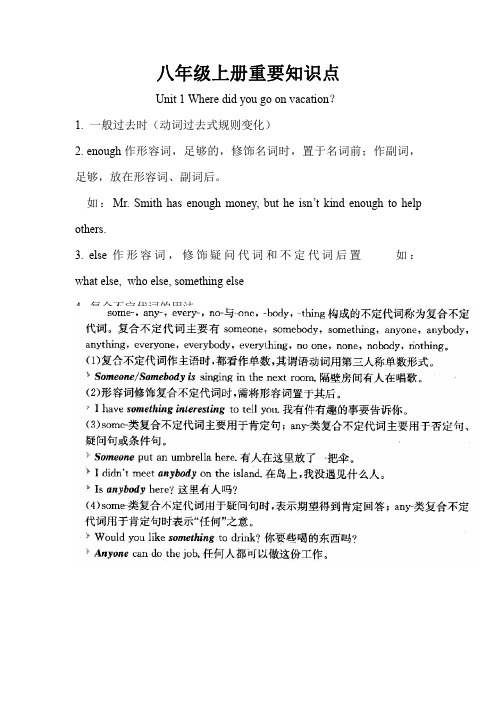
八年级上册重要知识点Unit1Where did you go on vacation?1.一般过去时(动词过去式规则变化)2.enough作形容词,足够的,修饰名词时,置于名词前;作副词,足够,放在形容词、副词后。
如:Mr.Smith has enough money,but he isn’t kind enough to help others.3.else作形容词,修饰疑问代词和不定代词后置如:what else,who else,something else4.复合不定代词的用法5.【延伸】one of+the most+adj+n复数,表示“最…之一”如:He is one of the most famous writers in China.a most+adj+n非常如:Hangzhou is a most beautiful city.6.反身代词①Did you buy anything for yourself?(做介词宾语)②The old man taught himself English.(做动词宾语)③The cow was itself again.又恢复了原状(做表语)④I myself visited my aunt last weekend.(做同位语)7.8.another two hours=two more hours9.感叹句①How+形容词+主语+谓语!②What a/an+形容词+可数名词单数+主语+谓语!What+形容词+复数名词/不可数名词+主语+谓语!10.so that引导目的状语从句,以便,为了(in order to)如:they got up early so that they could catch the bus.so+adj+that+结果状语从句,“如此……以致……”如:I was so busy that I didn’t go to sleep for3days.so+adj+(a/an+n单数)that如:It is so important a meeting that I can’t miss it.such+a/an+adj+n单数+that如:It is such an important meeting that I can’t miss it.such+adj+n复数/不可数+thatUnit2How often do you exercise?1.how如何(方式)how long多长(时间)答语常用“For+时间段”how far多远(距离)答语常用“It’s+数词+miles/meters/kilometers”how often多久一次(频率)答语常用“Always/often/every day/…”或“次数+时间”等表频率的状语how soon多快,多久以后,常用在将来时中。
人教版八年级英语上册知识点汇总与练习
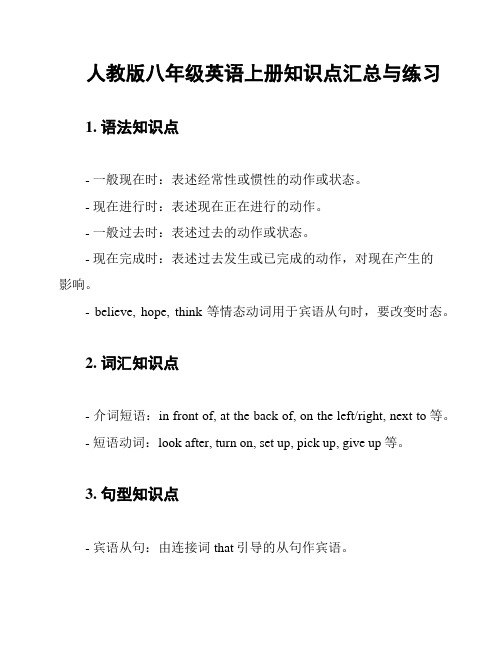
人教版八年级英语上册知识点汇总与练习1. 语法知识点- 一般现在时:表述经常性或惯性的动作或状态。
- 现在进行时:表述现在正在进行的动作。
- 一般过去时:表述过去的动作或状态。
- 现在完成时:表述过去发生或已完成的动作,对现在产生的影响。
- believe, hope, think等情态动词用于宾语从句时,要改变时态。
2. 词汇知识点- 介词短语:in front of, at the back of, on the left/right, next to等。
- 短语动词:look after, turn on, set up, pick up, give up等。
3. 句型知识点- 宾语从句:由连接词that引导的从句作宾语。
- 时间状语从句:由连接词when, before, after, while等引导的从句,用来表示时间关系。
- 目的状语从句:由连接词so that引导的从句,用来表示目的。
- 虚拟条件句:由连接词if引导的条件句,表示假设情况。
4. 阅读与写作练阅读材料:The Importance of ReadingHere are some tips to develop good reading habits:1. Set aside dedicated time for reading every day.2. Choose a variety of books based on your interests.3. Start with books that are at your reading level, and gradually challenge yourself.4. Take notes while reading to help with understanding and retention.5. Discuss the books you read with others to gain different perspectives.写作练:Write about your favorite book and explain why you like it.My favorite book is "Harry Potter and the Philosopher's Stone" by J.K. Rowling. I like this book because it takes me on a magical journey filled with adventure and excitement. The characters are well-developed and the story is captivating. I enjoy the creativity and imagination that Rowling brings to the world of Hogwarts. The book teaches important lessons about friendship, bravery, and the power of love. Overall, "Harry Potter and the Philosopher's Stone" is a book that brings joy and wonder to my life.5. 总结本文档汇总了人教版八年级英语上册的一些重要知识点,包括语法、词汇和句型。
人教版初中教学英语时态综合总结总结练习及答案
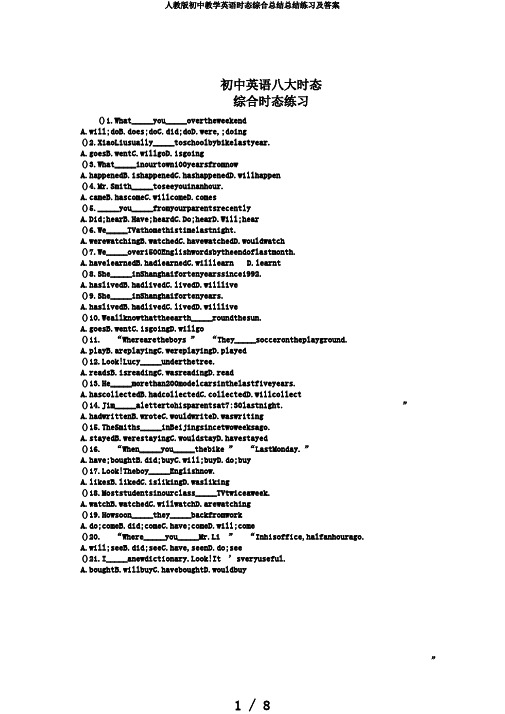
初中英语八大时态综合时态练习()1.What_____you_____overtheweekendA.will;doB.does;doC.did;doD.were,;doing()2.XiaoLiusually_____toschoolbybikelastyear.A.goesB.wentC.willgoD.isgoing()3.What_____inourtown100yearsfromnowA.happenedB.ishappenedC.hashappenedD.willhappen()4.Mr.Smith_____toseeyouinanhour.A.cameB.hascomeC.willcomees()5._____you_____fromyourparentsrecentlyA.Did;hearB.Have;heardC.Do;hearD.Will;hear()6.We_____TVathomethistimelastnight.A.werewatchingB.watchedC.havewatchedD.wouldwatch()7.We_____over1500Englishwordsbytheendoflastmonth.A.havelearnedB.hadlearnedC.willlearnD.learnt()8.She_____inShanghaifortenyearssince1992.A.haslivedB.hadlivedC.livedD.willlive()9.She_____inShanghaifortenyears.A.haslivedB.hadlivedC.livedD.willlive()10.Weallknowthattheearth_____roundthesun.A.goesB.wentC.isgoingD.willgo()11. “Wherearethebo ys ”“They_____soccerontheplayground.A.playB.areplayingC.wereplayingD.played()12.Look!Lucy_____underthetree.A.readsB.isreadingC.wasreadingD.read()13.He_____morethan200modelcarsinthelastfiveyears.A.hascollectedB.hadcollectedC.collectedD.willcollect()14.Jim_____alettertohisparentsat7:30lastnight.”A.hadwrittenB.wroteC.wouldwriteD.waswriting()15.TheSmiths_____inBeijingsincetwoweeksago.A.stayedB.werestayingC.wouldstayD.havestayed()16. “When_____you_____thebike”“LastMonday.”A.have;boughtB.did;buyC.will;buyD.do;buy()17.Look!Theboy_____Englishnow.A.likesB.likedC.islikingD.wasliking()18.Moststudentsinourclass_____TVtwiceaweek.A.watchB.watchedC.willwatchD.arewatching()19.Howsoon_____they_____backfromworkA.do;comeB.did;comeC.have;comeD.will;come()20. “Where_____you_____Mr.Li”“Inhisoffice,halfanhourago.A.will;seeB.did;seeC.have,seenD.do;see()21.I_____anewdictionary.Look!It ’sveryuseful.A.boughtB.willbuyC.haveboughtD.wouldbuy”()22.Iwon’twatchthemovietonight.I_____itbefo re.A.willseeB.haveseenC.sawD.hadseen()23.Hello!I_____knowyou_____inChengdu.HowlonghaveyoubeenhereA.didn’t;wereB.don’tareC.didn’t;areD.don’t;were()24.He_____afireandthencookedameal.A.hadmadeB.wasmakingC.madeD.hasmade()25.IfI_____timetomorrow,Iwillgotovisitmygrandfather.A.haveB.willhaveC.wouldhaveD.amhaving()26.I’mgoingtobeadoctorwhenI_____up.A.growB.willgrowC.grewD.amgrowing()27.Thefilm_____onforfiveminuteswhenIgottothecinema.A.hasbeenB.hadbeenC.wasD.is()28.She_____dinnerwhenhersoncamein.A.hascookedB.hadcookedC.wascookingD.wouldcook()29.Thetrain_____whenwegottothestation.Wehadtowaitforthenextone.A.hasleftB.hadleftC.leftD.wasleaving()30.Hesaidthathe_____tothebarber’stomorrowmorning.A.willgoB.wentC.isgoingD.wouldgo()31.InthelastyearsI_____alotoffriends.A.havemadeB.madeC.willmakeD.wasmaking()32.Theboys_____forabouttwohours.A.areplayingsoccerB.havebeenplayingsoccerC.wereplayingD.playsoccer()33.He_____soquicklythathecouldwintherace.A.isrunningB.willrunC.ranD.hadrun()34.Hedidn’tgotherewithsbecausehe_____therebe fore.A.hasbeenB.hadbeenC.wentD.wouldgo ()35.Idon’tknowifhe______tomorrow.Ifhe_____,Iwilltellyou.A.willcome;willcomees;comesC.willcome;comeses;willcome()36.WhenIwasyoung,mymothertoldmethatthesun_____intheeast.A.riseB.risesC.roseD.hadrisen()37.“_____you_____yourwork“Yes”.Ifinisheditanhourago.”A.Did;finishB.Have;finishedC.Will;finish D.Had;finished()38.Hurryup,oryou_____theearlybus.A.willmissB.hasmissedC.wouldmissD.missed()39.I_____Mr.GreenwhileI_____alongthestreetlastSunday.A.met;walkedB.wasmeeting;walkedC.met;waswalkingD.wasmeeting;waswalking()40.Tomisstrongandhe_____toschooleveryday.A.walkedB.walksC.willwalkD.haswalked ()41.Hesaidthathe_____withMr.Blackatthattime.A.talked B.wastalkingC.istalking D.wouldtalk()42.We_____Englishinthisschoolsincewecamehere.A.havestudiedB.studiedC.hadstudiedD.werestudying()43.She_____athomeuntilhermothercameback.A.hasstayedB.stayedC.hadstayedD.willstay()44.Therewillbeaninterestingmovie_____twodays .A.forB.inC.afterD.since()45.She_____thereuntilIcameback.A.didn’tleaveB.hasstayedC.leftD.wasstaying()46.Ithasbeenraining_____twohoursago.A.untilB.forC.sinceD.by()47.Hisfather_____sincehewastwoyearsold.A.hasdiedB.diedC.hasdeathD.hasbeendead ()48.Themeeting_____fortenminuteswhenIgotthereyesterday.A.hasbegunB.hadbegunC.hasbeenonD.hadbeenon ()49.Hehadcollectedover500stamps_____hewastwelveyearsold.A.sinceB.forC.untilD.bythetime ()50.Iwasdoingmyhomework_____sherangmeuplastnight.A.whenB.whileC.sinceD.befor e()51.“WhereisJohn“”He_____thelibrary.”A.hasbeentoB.hasgonetoC.hasbeeninD.hasbeenat()52.Howlong_____you_____thecomputerA.have;boughtB.did;buyC.have;hadD.will;buy()53.She_____Shanghaifortwodays.A.leftB.hasleftC.willleaveD.hasbeenawayfrom()54.Hedidn’ttellmeanythingaboutit_____h eleft.A.sinceB.untilC.bythetimeD.while ()55.She_____Chinasinceshewasfiveyearsold.A.hascometoB.hasarrivedatC.hasarrivedinD.hasbeenin()56.Ihadfinishedmyhomework_____IwatchedTVlastnight.A.beforeB.afterC.whenD.until()57.MissWhitehasbeen_____themusicclubfor4years.A.joiningB.joinC.joinedD.i n()58.Whatdoyouthinkhewill_____tenyearsA.beforB.beatC.betoD.bein()59.There_____twofootballgamesinourschoolnextweek.A.isgoingtobeB.willhaveC.willbeD.isgoingtohave()60.They_____abirthdaypartynextFridayafternoon.A.isgoingtobeB.willbeC.willhaveD.isgoingtohave()61.Howlonghaveyou____thepenA.keptB.boughtC.borrowedD.got()62.I_____Mr.BrownsinceIleftShanghaiin2004.A.haveseenB.sawC.haven’tseenD.didn’tsee()63.Youdon’thavetocribedesher.I_____herseveraltimes.A.hadmetB.havemetC.metD.meet()64.I_____acoldforfivedays.Istillcan’tgetridofit.A.caughtB.hadC.havecaughtD.havehad()65.What_____you_____atnineo’clockthatmorningA.are;doingB.did;doC.were;doingD.had;done()66.What_____you_____bynineo’clockthatmorningA.are;doingB.did;doC.were;doingD.had;done()67.Thesign_____,“NoParking!”A.readsB.wasreadC.isreadingD.read()68.“_____you_____yourlunch“Yes”.I_____itatschool.”A.Did;have;havehadB.Have;had;hadC.Did;have;hadD.Have;had;have()69.Lily_____forhermotheruntilshe_____home.A.willwait;willcomeB.won’twait;comesC.willwait;comesD.waits;willcome()70.“Mr.Brownisleavingforatrip.“Really”Where_____he_____”A.has;goneB.will;goC.did;goD.does;go()71.Tom,you_____thebookfortwoweeks.Youhavetoreturnitnow.A.borrowedB.haveborrowedC.keptD.havekept()72.“Haveyoumendedyourshoes“”Yes.I_____ittwentyminutesago.”A.havemendedB.mendedC.hadmendedD.willmend()73.Mr.Smith_____toChinalastyearand_____inlovewithher.A.goes;fallsB.went;fellC.went;feltD.hasgone;fell()74.Ifyoudon’tgotothemeetingtomorrow,____ _.A.hewill,tooB.hewon’t,eitherC.hedoes,too D.hedoesn’t,either()75.“Shallwegowatchingthematch“Sorry,”Ican’t.I_____myhomework.”A.doB.havedoneC.amdoingD.did()76.Thechildrenwon’tgohikingifit_____nextSunday.A.rainB.rainsC.willrainD.israining()77.“_____you_____toJapan“Yes.”Iwillgotherenextmonth.”A.Have;beenB.Have;goneC.Are;goingD.Did;go()78.WhenIgotthere,thefilm_____forfiveminutes.A.hadbeenonB.hadbegunC.wasbeginningD.began()79.Don’topenthedooruntilthebus_____.A.willstopB.doesn’tstopC.isstoppingD.stops()80.“_____you_____toJapan“Yes”.Wewenttherelastyear.”A.Have;beenB.Have;goneC.Did;goD.Are;going参照答案:1-5CBDCB6-10ABBAA11-15BBADD16-20BAADB 21-25CBACA26-30ABCBD31-35ABCBC36-40BBACB41-45BABBA46-50CDDDA51-55BCDBD56-60ADDCC61-65ACBDC66-70DABCB71-75BBBBC76-80BCADA。
人教版八年级英语上时态讲义及练习
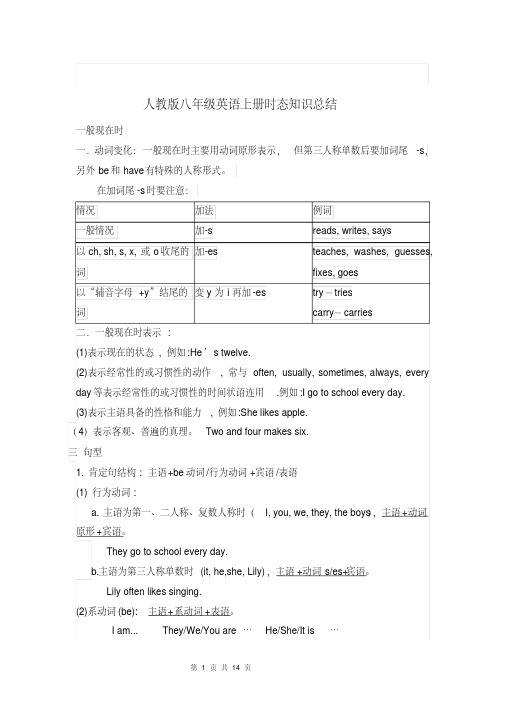
人教版八年级英语上册时态知识总结一般现在时一.动词变化:一般现在时主要用动词原形表示,但第三人称单数后要加词尾-s,另外be和have有特殊的人称形式。
在加词尾-s时要注意:情况加法例词一般情况加-s reads, writes, says以ch, sh, s, x, 或o收尾的词加-es teaches, washes, guesses,fixes, goes以“辅音字母+y”结尾的词变y为i再加-es try-triescarry-carries二.一般现在时表示:(1)表示现在的状态, 例如:He’s twelve.(2)表示经常性的或习惯性的动作, 常与often, usually, sometimes, always, every day等表示经常性的或习惯性的时间状语连用.例如:I go to school every day. (3)表示主语具备的性格和能力, 例如:She likes apple.(4)表示客观、普遍的真理。
Two and four makes six.三句型1. 肯定句结构: 主语+be动词/行为动词+宾语/表语(1) 行为动词:a. 主语为第一、二人称、复数人称时(I, you, we, they, the boys),主语+动词原形+宾语。
They go to school every day.b.主语为第三人称单数时(it, he,she, Lily),主语+动词s/es+宾语。
Lily often likes singing.(2)系动词(be): 主语+系动词+表语。
I am... They/We/You are… He/She/It is…2.否定句结构: 主语+be动词/行为动词+宾语/表语(1) 行为动词:a. 主语为第一、二人称,复数人称时,主语+don’t+动词原形。
They don’t go to school every day.b.主语为第三人称单数时,主语+doesn’t +动词原形。
新人教版八年级上册英语语法,短语和知识点总结

新人教版八年级上册英语语法,短语和知识点总结一、语法1、时态(1)一般现在时:表示经常性或习惯性的动作或存在的状态,常和表示频度的时间状语连用,如:always, usually, often, sometimes, seldom, never等。
(2)一般过去时:表示过去发生的动作或存在的状态,常和表示过去的时间状语连用,如:yesterday, last week, an hour ago, in 2004等。
(3)现在完成时:表示从过去某一时间一直持续到现在的动作或状态,常和表示过去的时间状语连用,如:since, for, already, yet等。
(4)过去完成时:表示过去某一时间之前已经发生或完成的动作,常和表示过去的时间状语连用,如:before, by the time, when, after等。
2、情态动词(1)can:能够、会(2)could:能够、会(过去式)(3)must:必须(4)have to:不得不、必须(5)should:应该、将要(6)would:将要(过去式)3、虚拟语气(1)一般现在时:主语+should/were to +动词原形+其他(2)一般过去时:主语+should/were to have +过去分词+其他二、短语1、make a difference:有影响,有区别2、at once:立即,马上3、take care of:照顾,照料4、in the end:最后,终于5、be good at:擅长于6、as well as:也,又7、keep healthy:保持健康8、come true:实现,成真三、知识点一般现在时:表示经常性或习惯性的动作或存在的状态,常和表示频度的时间状语连用,如:always, usually, often, sometimes, seldom, never等。
人教版八年级上册英语知识点总结

人教版八年级上册英语知识点总结一、语法重点1. 时态- 一般现在时:表示经常发生的动作或状态,以及普遍真理。
- 一般过去时:描述过去发生的动作或状态。
- 现在进行时:表示正在进行的动作。
- 过去进行时:描述过去某一时刻正在进行的动作。
2. 代词- 人称代词主格:I, you, he, she, it, we, they。
- 物主代词:my, your, his, her, its, our, their。
- 反身代词:myself, yourself, himself, herself, itself, ourselves, yourselves, themselves。
3. 介词- 表示时间的介词:at, on, in。
- 表示地点的介词:at, on, in。
- 其他常用介词:with, by, for, from, to, of。
4. 句型结构- 一般疑问句:使用助动词do/does构成。
- 特殊疑问句:使用疑问词who, what, where, when, why, how 等。
- 否定句:使用助动词do/does后跟not。
5. 词汇- 动词短语:take off, turn on/off, get up, go to bed等。
- 形容词和副词:big/large, small, quick/fast, slowly, carefully等。
- 常用名词:student, teacher, school, family, friend等。
二、词汇与短语1. 学校相关词汇- classroom, teacher, student, library, gym, cafeteria。
- subject, lesson, homework, project, test, exam。
2. 家庭与朋友- family, parent, brother, sister, friend, neighbor。
人教版初中八年级英语常用语法知识——动词时态复习题(含答案解析)

一、选择题1.—I am feeling ill. What should I do?— eating junk food and breakfast every day.A.Stop; having B.Stop; have C.To stop; have. D.To stop; to have B 解析:B【解析】【分析】【详解】句意:——我感觉生病了。
我该做什么?——停止吃快餐并且每天吃早餐。
考查祈使句。
根据句意可知第二句为祈使句,动词原形开头。
stop doing sth停止做某事;have breakfast 吃早饭。
此处stop和have是并列的动词,用连词and连接。
故选B。
2.Colours can change our moods and make us happy or sad .A.feel B.to feelC.felt D.feeling A解析:A【解析】【分析】考查:非谓语动词【详解】句意:色彩可以改变我们的心情,让我们感到快乐或悲伤,充满活力或疲倦。
短语make sb. do sth. 使/让某人做某事;用省略to的不定式做宾补;故选A。
3.Here _______a nice photo of my family.A.am B.be C.is D.are C解析:C【解析】【详解】句意:这是一张我家漂亮全家福。
考查倒装和be动词。
分析句子可知,此句主语是a nice photo of my family,表单数,所以需用表单数的be动词。
故选C。
4.These chicken wings taste ________. I want more.A.well B.wonderfully C.nice D.bad C解析:C【解析】【详解】句意:这些鸡翅尝起来不错。
我想要更多。
考查感官动词的用法及形容词辨析。
well好,副词;wonderfully精彩地;nice好的;bad 坏的。
人教版英语初二英语英语动词的时态知识点总结附答案

人教版英语初二英语英语动词的时态知识点总结附答案一、初中英语动词的时态1.- Mr. Black will go to Shanghai in a few days. Do you know when the earliest plane _____on Sunday?- At 10:00am.A.leaves off B.took off C.is leaving off D.is taking off【答案】D【解析】句意:——布莱克先生几天后将去上海。
你知道星期日最早的飞机什么时候起飞吗?——上午10点。
考查动词短语和时态辨析题。
leave off停止,中断(做某事);take off (飞机)起飞,都是固定短语,可知后者符合句意,可排除AC两项。
问句是时间状语从句,主句do是一般现在时,可知过去式took错误,结合答语At 10:00am.是将来的时间,故选D。
2.--- Where’s my father? Could tell me?--- He to Beijing. He’ll attend an important meeting.A.goes B.is going C.has gone D.has been【答案】C【解析】【详解】句意:——我的父亲在哪里?可以告诉我吗?——他已经去北京了。
他将参加一个重要会议。
考查动词时态辨析。
根据句意语境,可知父亲不在说话的地点已经去了北京,需用现在完成时,可排除AC两项。
have been to意为“曾经去过某地”,现在已不在那里了;have gone to意为“到某地去了”,说话时作句子主语的人不在现场,故选C。
3.---Where is Mr. Wang?---He together with his students _______ Haibin Park.A.have gone to B.has gone to C.has been to D.have been to【答案】B【解析】【详解】句意“-王先生去哪里了?-他和他的学生去了海滨公园”。
- 1、下载文档前请自行甄别文档内容的完整性,平台不提供额外的编辑、内容补充、找答案等附加服务。
- 2、"仅部分预览"的文档,不可在线预览部分如存在完整性等问题,可反馈申请退款(可完整预览的文档不适用该条件!)。
- 3、如文档侵犯您的权益,请联系客服反馈,我们会尽快为您处理(人工客服工作时间:9:00-18:30)。
人教版八年级英语上册时态知识总结一般现在时一.动词变化:一般现在时主要用动词原形表示,但第三人称单数后要加词尾-s,另外be和have有特殊的人称形式。
在加词尾-s时要注意:二.一般现在时表示:(1)表示现在的状态, 例如:He’s twelve.(2)表示经常性的或习惯性的动作, 常与often, usually, sometimes, always, every day等表示经常性的或习惯性的时间状语连用.例如:I go to school every day. (3)表示主语具备的性格和能力, 例如:She likes apple.(4)表示客观、普遍的真理。
Two and four makes six.三句型1. 肯定句结构: 主语+be动词/行为动词+宾语/表语(1) 行为动词:a. 主语为第一、二人称、复数人称时(I, you, we, they, the boys),主语+动词原形+宾语。
They go to school every day.b.主语为第三人称单数时(it, he,she, Lily),主语+动词s/es+宾语。
Lily often likes singing.(2)系动词(be): 主语+系动词+表语。
I am... They/We/You are… He/She/It is…2.否定句结构: 主语+be动词/行为动词+宾语/表语(1) 行为动词:a. 主语为第一、二人称,复数人称时,主语+don’t+动词原形。
They don’t go to school every day.b.主语为第三人称单数时,主语+doesn’t +动词原形。
Lily doesn’t like singing.(2)系动词(be): 主语+is/am/are后加not+表语I am not a worker.3. 一般疑问句结构:(1)行为动词a. 主语为第一、二人称,复数人称时,Do+they/we/you+动词原形Do they go to school every day? (Yes, they do. No, they don’t.)b.主语为第三人称单数时,Does +he/she/iIt+动词原形Does Lily often like singing? (Yes, she does. No, she doesn’t.)(2) 系动词(be): is/am/are+主语+表语Are you a worker? (Yes, I am. No, I’m not.)4.特殊疑问句结构特殊疑问词(what, how often, which, where,who)+一般疑问句?(1)行为动词What do they do every day?How often does Peter go fishing?(2) 系动词(be):Who is the girl at that gate?一般过去时一.动词变化:一般过去时主要表示过去的动作或状态,在句中由主语+动词的过去式来表达。
二.一般过去时表示:(1)表示过去某个时间发生的动作或存在的状态.常与yesterday…, last…, …ago, in1990等表示过去状态的时间状语连用,如What did you have for breakfast this morning?(2)表示过去某一段时间内经常或反复发生的动作,这时常和表示频度的状语连用,如Last term we often did experiments.三.句型1. 肯定句结构:(1) 行为动词: 主语+动词的过去式The twins went to school two hours ago.(2) 系动词(be): I/ He/She/It+was… They/We/You+were…I was at home last night.2.否定句结构:(1) 行为动词: 主语+didn’t+动词原形The twins didn’t go to school two hours ago.(2)系动词(be): 主语+wasn’t/weren’t+表语。
I wasn’t at home last night.3. 一般疑问句结构:(1) 行为动词: Did+主语+动词原形…?Did the twins go to school two hours ago?(Yes, they did. No, they didn’t.)(2)系动词(be): was/were+主语+表语…?Were you at home last night?(Yes, I was. No, I was’t.)4.特殊疑问句结构特殊疑问词(what, how often, which, where,who)+一般疑问句?★频度副词:通常用于一般现在时或一般过去时,频率副词常放在行为动词之前,系动词、情态动词或助动词之后。
1.常见的频度副词有:always(总是,一直)、usually(通常)、often(常常,经常)、sometimes(有时候)、never(从不)、hardly ever(几乎从不)、every day(每天)。
2.频度副词的位置:a.放在系动词、助动词或情态动词后面。
David is often arrives late for school. 大卫上学经常迟到。
b.放在行为动词前。
We usually go to school at 7:10 every day. 我们每天经常在7:10去上学。
c. sometimes可放在句首或句尾,用来表示强调。
Sometimes I walk home, and sometimes I rides a bike. 有时我步行回家,有时我骑自行车。
3. every day 与everydaya. every day作状语,译为“每一天”。
如:We go to school at 7:10 every day. 我们每天7:10去上学。
I decide to read English every day. 我决定每天读英语。
b. everyday 作定语,译为“日常的”。
She watches everyday English on TV after dinner. 她晚饭后在电视上看日常英语。
What's your everyday activity? 你的日常活动是什么?★练习1. How often _does____ your father drink__(drink) wine?2. His mother __comes___ (come) to see him once a week.3. Her sister __will not stay___ (not stay) at home on Sundays.4. Where __were___ (be) you last night?5. She exercises every day. (划线部分提问)__How often__ __does she __ exercise ?6. Jim always does his homework after school.(改为否定句)Jim ____never does__ his homework after school.7. He never goes fishing, ___does he___?(完成反意疑问句)8. He (go)__goes____to the park every day.9. __Do____ Lucy and Lily (like)__ like ____China?10. Li Lei(not like)__doesn't like____ to drink orange soda.11. ___Did___Li Ming’s father (have)_ have_____ his lunch at home?12. Everybody (have)__has ____ a chance to win.13.___ Did ___you make this cake last night? Yes. I did.14.Did Tom ____go___ home at five yesterday?No, he ____didn’t___. He came home at six.15.What ____did___ you ___buy____ at the store? I bought a camera.16. Were you at home yesterday? Yes, I __was_____.17. Where did you catch the fish? I _______ it in the river near my house.18.When I ______(knock)at his door, he was cooking.19.Tom and I ______(am, are, was, were)late for school yesterday.20.If you want to improve your spoken English, you must speak more ____ English ____.A. everyday; every day;B. every day; everyday;现在进行时一.动词变化:现在进行时由“am /is /are+动词现在分词”构成。
加-ing的规则如下:(1)一般在动词原形末尾加-ing。
stay-staying do-doinglisten-listening suffer-sufferingwork-working spend-spendinglook-looking(2)以不发音的字母e结尾的动词,先去掉e,再加-ing。
make-making take-takinggive-giving ride-ridingplease-pleasing refuse-refusingclose-closing operate-operating(3)以一个辅音字母结尾的重读闭音节词,先双写这个辅音字母,再加-ing。
put-putting sit-sittingrun-running win-winningbegin-beginning二.现在进行时表示:(1)表示说话时正在进行或发生的动作,这时可以不用时间状语,也可以和now, at present, at the moment等时间状语连用。
